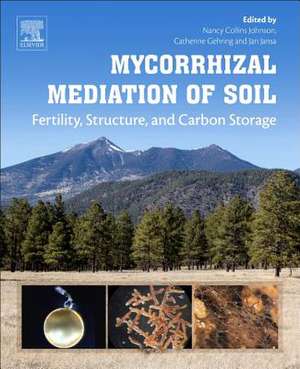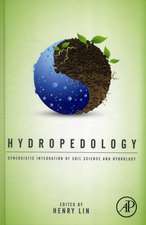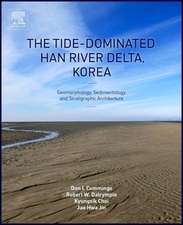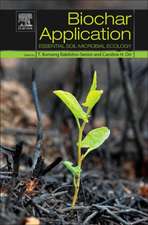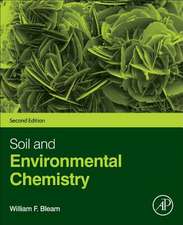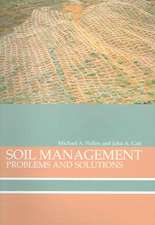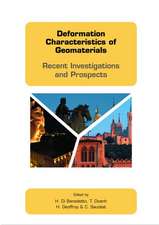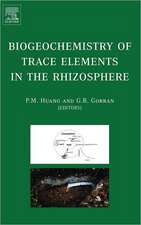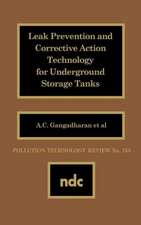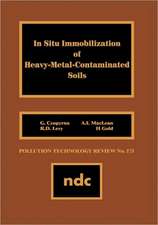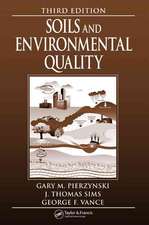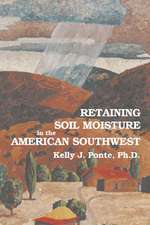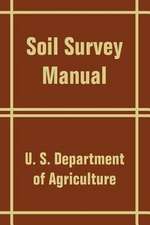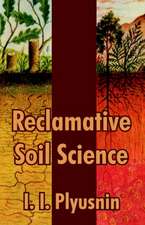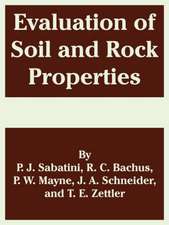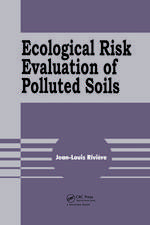Mycorrhizal Mediation of Soil: Fertility, Structure, and Carbon Storage
Autor Nancy Collins Johnson, Catherine Gehring, Jan Jansaen Limba Engleză Paperback – 25 noi 2016
This edited book presents a unique synthesis of the influence of environmental change on mycorrhizas across a wide range of ecosystems, as well as a clear examination of new discoveries and challenges for the future, to inform land management practices that preserve or increase below ground carbon storage.
- Synthesizes the abundance of research on the influence of environmental change on mycorrhizas across a wide range of ecosystems from a variety of leading international researchers
- Focuses on the specific role of mycorrhizal fungi in soil processes, with an emphasis on soil development and carbon storage, including coverage of cutting-edge methods and perspectives
- Includes a chapter in each section on future avenues for further study
Preț: 566.97 lei
Preț vechi: 696.08 lei
-19% Nou
Puncte Express: 850
Preț estimativ în valută:
108.49€ • 113.27$ • 89.79£
108.49€ • 113.27$ • 89.79£
Carte tipărită la comandă
Livrare economică 29 martie-12 aprilie
Preluare comenzi: 021 569.72.76
Specificații
ISBN-13: 9780128043127
ISBN-10: 0128043121
Pagini: 526
Dimensiuni: 191 x 235 x 31 mm
Greutate: 1.04 kg
Editura: ELSEVIER SCIENCE
ISBN-10: 0128043121
Pagini: 526
Dimensiuni: 191 x 235 x 31 mm
Greutate: 1.04 kg
Editura: ELSEVIER SCIENCE
Cuprins
1. Mycorrhizas: At the Interface of Biological, Soil, and Earth Sciences
Section I. Mycorrhizal Mediation of Soil Development2. Mycorrhizal Symbioses and Pedogenesis Throughout Earth’s History3. Role of Mycorrhizal Symbiosis in Mineral Weathering and Nutrient Mining from Soil Parent Material4. Mycorrhizal Interactions With Climate, Soil Parent Material, and Topography5. Mycorrhizas Across Successional Gradients
Section II. Mycorrhizal Mediation of Soil Fertility6. Introduction: Perspectives on Mycorrhizas and Soil Fertility7. Fungal and Plant Tools for the Uptake of Nutrients in Arbuscular Mycorrhizas: A Molecular View8. Accessibility of Inorganic and Organic Nutrients for Mycorrhizas9. Mycorrhizas as Nutrient and Energy Pumps of Soil Food Webs: Multitrophic Interactions and Feedbacks10. Implications of Past, Current, and Future Agricultural Practices for Mycorrhiza-Mediated Nutrient Flux11. Integrating Ectomycorrhizas Into Sustainable Management of Temperate Forests12. Mycorrhizal Mediation of Soil Fertility Amidst Nitrogen Eutrophication and Climate Change
Section III. Mycorrhizal Mediation of Soil Structure And Soil-Plant Water Relations13. Introduction: Mycorrhizas and Soil Structure, Moisture, and Salinity14. Mycorrhizas and Soil Aggregation15. Arbuscular Mycorrhizal Fungi and Soil Salinity16. Mycorrhizas, Drought, and Host-Plant Mortality17. Soil Water Retention and Availability as Influenced by Mycorrhizal Symbiosis: Consequences for Individual Plants, Communities, and Ecosystems18. Mycorrhizal Networks and Forest Resilience to Drought
Section IV. Mycorrhizal Mediation of Ecosystem Carbon Fluxes and Soil Carbon Storage19. Introduction: Mycorrhizas and the Carbon Cycle20. Carbon and Energy Sources of Mycorrhizal Fungi: Obligate Symbionts or Latent Saprotrophs?21. Magnitude, Dynamics, and Control of the Carbon Flow to Mycorrhizas22. Trading Carbon Between Arbuscular Mycorrhizal Fungi and Their Hyphae-Associated Microbes23. Immobilization of Carbon in Mycorrhizal Mycelial Biomass and Secretions24. Mycorrhizal Interactions With Saprotrophs and Impact on Soil Carbon Storage25. Biochar—Arbuscular Mycorrhiza Interaction in Temperate Soils26. Integrating Mycorrhizas Into Global Scale Models: A Journey Toward Relevance in the Earth’s Climate System
Section I. Mycorrhizal Mediation of Soil Development2. Mycorrhizal Symbioses and Pedogenesis Throughout Earth’s History3. Role of Mycorrhizal Symbiosis in Mineral Weathering and Nutrient Mining from Soil Parent Material4. Mycorrhizal Interactions With Climate, Soil Parent Material, and Topography5. Mycorrhizas Across Successional Gradients
Section II. Mycorrhizal Mediation of Soil Fertility6. Introduction: Perspectives on Mycorrhizas and Soil Fertility7. Fungal and Plant Tools for the Uptake of Nutrients in Arbuscular Mycorrhizas: A Molecular View8. Accessibility of Inorganic and Organic Nutrients for Mycorrhizas9. Mycorrhizas as Nutrient and Energy Pumps of Soil Food Webs: Multitrophic Interactions and Feedbacks10. Implications of Past, Current, and Future Agricultural Practices for Mycorrhiza-Mediated Nutrient Flux11. Integrating Ectomycorrhizas Into Sustainable Management of Temperate Forests12. Mycorrhizal Mediation of Soil Fertility Amidst Nitrogen Eutrophication and Climate Change
Section III. Mycorrhizal Mediation of Soil Structure And Soil-Plant Water Relations13. Introduction: Mycorrhizas and Soil Structure, Moisture, and Salinity14. Mycorrhizas and Soil Aggregation15. Arbuscular Mycorrhizal Fungi and Soil Salinity16. Mycorrhizas, Drought, and Host-Plant Mortality17. Soil Water Retention and Availability as Influenced by Mycorrhizal Symbiosis: Consequences for Individual Plants, Communities, and Ecosystems18. Mycorrhizal Networks and Forest Resilience to Drought
Section IV. Mycorrhizal Mediation of Ecosystem Carbon Fluxes and Soil Carbon Storage19. Introduction: Mycorrhizas and the Carbon Cycle20. Carbon and Energy Sources of Mycorrhizal Fungi: Obligate Symbionts or Latent Saprotrophs?21. Magnitude, Dynamics, and Control of the Carbon Flow to Mycorrhizas22. Trading Carbon Between Arbuscular Mycorrhizal Fungi and Their Hyphae-Associated Microbes23. Immobilization of Carbon in Mycorrhizal Mycelial Biomass and Secretions24. Mycorrhizal Interactions With Saprotrophs and Impact on Soil Carbon Storage25. Biochar—Arbuscular Mycorrhiza Interaction in Temperate Soils26. Integrating Mycorrhizas Into Global Scale Models: A Journey Toward Relevance in the Earth’s Climate System
